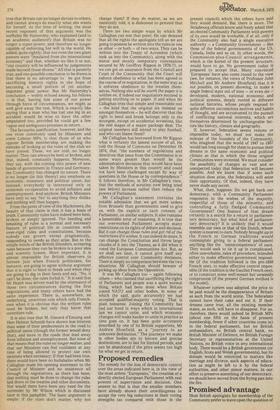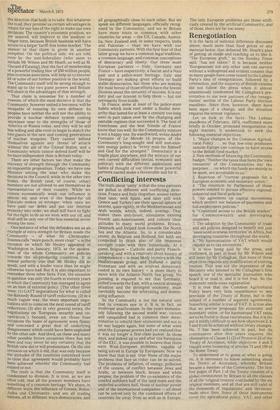Promised advantage
Most British apologists for membership of the Community prefer to leave open the question of the direction that body is to take. But whatever the road, they promise us certain advantages in return for our loss of the right to make our own decisions. The country's economic position, we are assured, will improve in the medium or longer term, because British business will have access to a larger `tariff-free home market.' The answer to that claim is given in another pamphlet. On the political side, we are told, even by the anti-federalists (who seem to include Mr Wilson and Mr Heath, as well as M. Giscard d'Estaing), that the fact of membership of a powerful trading bloc of 250 million people, plus overseas associates, will help us to recover all or some of our former position in the world. The Community itself will be strong enough to stand up to the two giant powers and Britain will share in the advantages of that strength.
That claim is nonsense for a number of reasons, of which the most decisive is that the Community, however united it becomes, will be incapable of ensuring its own defence. Its Peoples have neither the will nor the ability to provide a nuclear defence system coming anywhere near to the strengths of those of America or Russia today, and they will be still less willing and able even to begin to match the two giants in the new and coming generations of nuclear weapons. They cannot defend themselves against any threat of attack Without the aid of the United States, and a Community which cannot defend itself will be no more independent than is Britain today.
There are other factors too that make the recovery of strength through the Community an impossible proposition. Today, we have one Minister among the nine who make the decisions in the Council, while in the other two bodies, the British (and, of course, other) members are not allowed to see themselves as representatives of their country. While we remain economically weak our influence is almost nil, and even if the hoped-for oil Eldorado makes us stronger, when once we have paid our debts and put our internal economy into order, we shall still have to fight for the right to do as we wish with our oil, and shall still be only one of the less essential seven among the nine.
One instance of what the defenders see as an example of extra strength for Britain inside the Community — of what Sir Christopher Soames calls "more punch, more clout" — is the occasion on which Mr Healey appeared in Washington in January, 1975, as the spokesman of the whole Community on policies towards the oil-producing countries. It is indeed perfectly true that Mr Healey did so speak, and with a louder voice than he might otherwise have had. But it is also important to remember three other facts. First, the occasion in question was only the fourth in sixteen years in which the Community has managed to agree on an item of external policy. (The other three were: (1) GATT negotiations for what is called. the Kennedy Round of tariff reductions; (2) in a much vaguer way, the more important negotiations still to come on the next round of tariff reductions; (3) also in very general terms, the negotiations on `European security and cooperation.') Second, even on those four occasions the bases of agreement were flimsy and concealed a great deal of underlying disagreement which could have been exploited by the other side. And third, on these and many other possible future occasions there has not been and may never be any certainty that the British view did or will predominate. On the one occasion on which it did, that was only because the attitudes of the countries concerned were so close that agreement would probably have been achieved .whethIer the Community had existed or not.
The truth is that the Community itself is condemned to division. It is true, as we are often told, that all the present members have something of a common heritage. We share, in different ways, the influence of Greece, Rome, Judea and Christianity, and are all trading nations, all in different ways democracies, and all geographically close to each other. But we speak six different languages, officially recognised by the Community, and we in Britain have more traits in common with other countries far away — the US, Canada, Australia, New Zealand and, in some respects, India and Pakistan — than we have with our Community partners. With the first four of that latter group we have a common legal tradition, a common language, and common conceptions of democracy and liberty. Our three main European partners — Italy, Germany and France — have respectively, a fascist and a Nazi past and a police-state heritage. Italy and Germany are making great efforts to build stable democracies, but those who are making the most heroic of those efforts have the fewest illusions about the certainty of success. It is our duty and our interest to help them — but not necessarily from inside. In France, some at least of the police-state habits which took root under a feudal monarchy that lasted for at least a century too long were in part taken over by the changing and unstable regimes that succeeded it. The best of Frenchmen and the best friends of France know that too well. So the Community mixture is not a happy one. Its watchword, wrote Andre Fontaine of Le Monde (A propos of the Community's long-sought and still non-existent energy policy) is "every man for himself and God for the strongest." Democracy is a fragile plant anywhere, and the mixture of our own current difficulties (social, economic and political) with the different aspirations and habits of thought of our three most powerful partners cannot make a favourable soil for it.











































 Previous page
Previous page